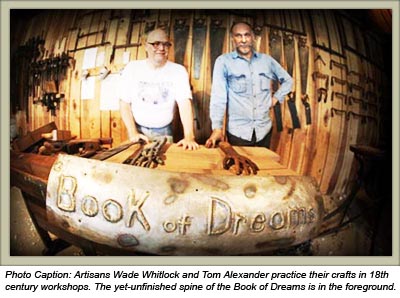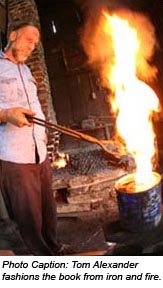“All that is necessary for the triumph of evil is that good men do nothing.†(Edmund Burke)
The Book of Dreams is living testament to good people who chose to act when the evil of slavery governed in America. Written by American school children in the 21st century, it will tell the stories of ordinary people, black and white, enslaved and free, who tapped into deep waters and together worked to create safe passage to freedom on the Underground Railroad for thousands of American slaves. The Book’s creator, Gandhi Hurwitz, sees the project as a way for children to understand that if their ancestors could work together in such a tumultuous and primitive world, so can they in today’s world.
 Born at the Steppingstone Museum in Havre de Grace, Maryland, the Book of Dreams was “beaten out of the fire, carved out of wood†by Steppingstone’s resident blacksmith, Tom Alexander, and Masters of the Shop and woodworkers, Wade Whitlock and John Weifenbach, with jointing by Joe Cambria. It is massive, structural, permanent. Handcrafted entirely of iron and black walnut, it measures 30â€x 36†x 9†and weighs in at about 60 lb. Visitors to Steppingstone’s Fall Harvest Festival on September 23 and 24, 2006 will be able to watch these master craftsmen put the final touches on the Book of Dreams, using traditional techniques and hand- and foot-powered tools.
Born at the Steppingstone Museum in Havre de Grace, Maryland, the Book of Dreams was “beaten out of the fire, carved out of wood†by Steppingstone’s resident blacksmith, Tom Alexander, and Masters of the Shop and woodworkers, Wade Whitlock and John Weifenbach, with jointing by Joe Cambria. It is massive, structural, permanent. Handcrafted entirely of iron and black walnut, it measures 30â€x 36†x 9†and weighs in at about 60 lb. Visitors to Steppingstone’s Fall Harvest Festival on September 23 and 24, 2006 will be able to watch these master craftsmen put the final touches on the Book of Dreams, using traditional techniques and hand- and foot-powered tools.
The Book of Dreams will “visit†its first school during Black History Month, in February 2007, where the students at Harford Friends School in Darlington, Maryland will research local Underground Railroad history and write Chapter One as a parent-led and expert guest enrichment activity. Hurwitz, whose daughter Clairellen attends the school, says he was inspired by local Quakers who worked on the Railroad, including members of Deer Creek Meeting where the school is located. (The previous Meetinghouse in Darlington is believed to have been burned down by arsonists who objected to Quakers’ antislavery activities.)
 After leaving Harford Friends, the Book will travel far and wide to schools along Railroad routes in Maryland and beyond, perhaps circulating as far south as North Carolina. Students from each school will research local Railroad history and write a Book chapter. Each chapter will be recorded on a large sheet of archival cotton paper and entered into the Book. Hurwitz has invited Tamika Hudson, an actor and Harriet Tubman interpreter, to contribute a written piece in Tubman’s voice. After the Book has circulated, it will return to its permanent repository at Harford Friends School where 8th grade students will write the last chapter as part of their year-long study of Harford County and American history.
After leaving Harford Friends, the Book will travel far and wide to schools along Railroad routes in Maryland and beyond, perhaps circulating as far south as North Carolina. Students from each school will research local Railroad history and write a Book chapter. Each chapter will be recorded on a large sheet of archival cotton paper and entered into the Book. Hurwitz has invited Tamika Hudson, an actor and Harriet Tubman interpreter, to contribute a written piece in Tubman’s voice. After the Book has circulated, it will return to its permanent repository at Harford Friends School where 8th grade students will write the last chapter as part of their year-long study of Harford County and American history.
Hurwitz calls Steppingstone the perfect birthplace for the Book of Dreams. Located on the site of a Quaker family farm believed to have been a station on the Underground Railroad, Steppingstone is a living history museum and interpretive center of American farm life near the Mason-Dixon line. Hurwitz found receptive partners when he first presented his vision to Steppingstone’s Director, Linda Noll, its board of directors and craftsmen. Under the Museum’s sponsorship, the craftsmen – all volunteers – have dedicated dozens of hours to building the Book.
The Book’s striking appearance was inspired by a design created by Clairellen Hurwitz. Two wrought iron, life-size arms – one shackled and skeletal, the other unshackled – reach across the Books’ black walnut cover. They are connected by a railroad track. A hand-carved rendering of the African continent rises out of the wood. A burnished iron North Star sits near the top. “Book of Dreams†is boldly embossed along the Book’s iron spine. You can view photographs of the Book on the project’s website: www.bookofdreamsproject.org
Via EPR Network
More Education press releases
